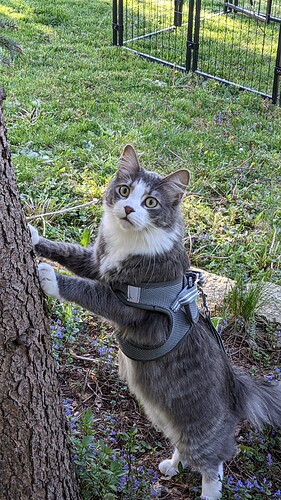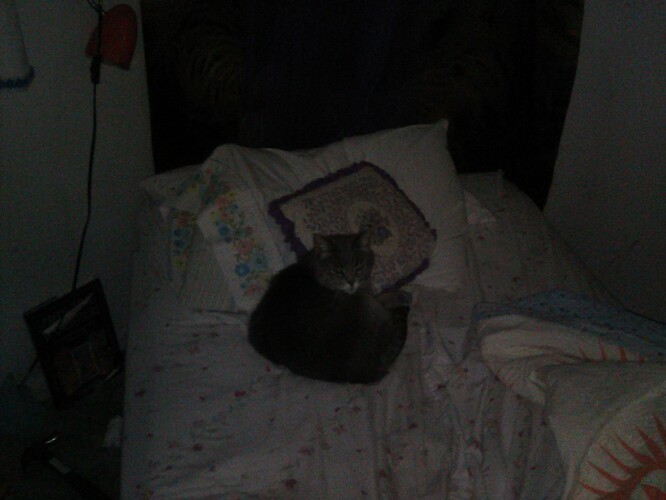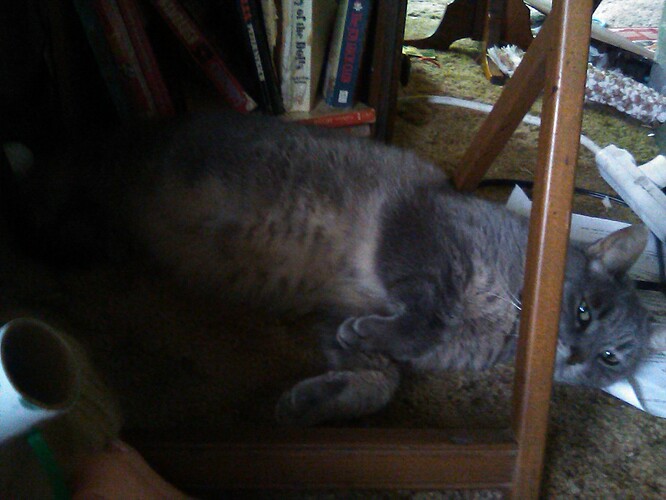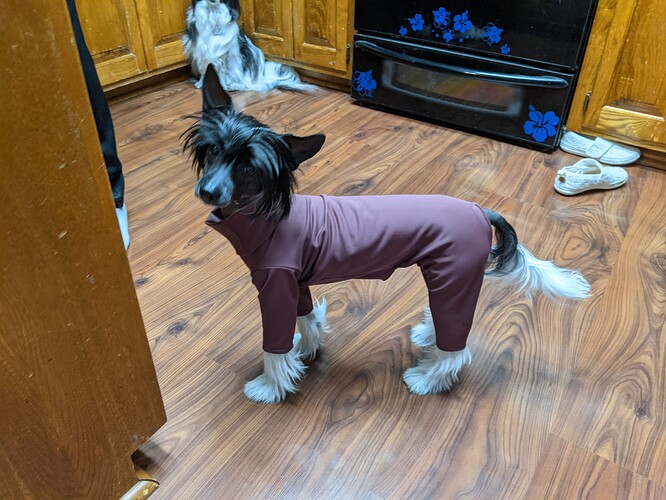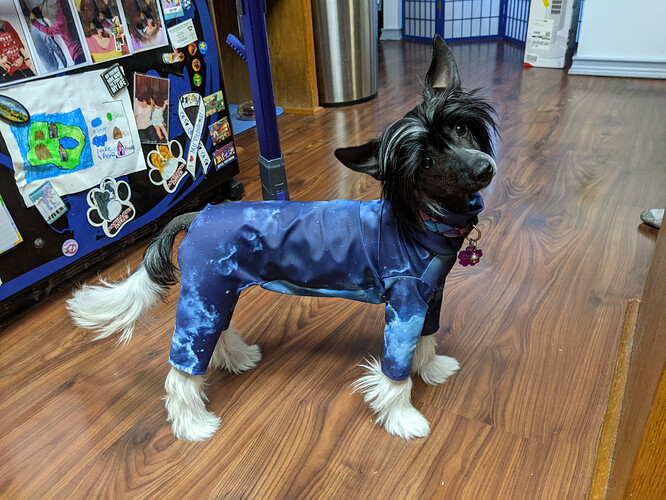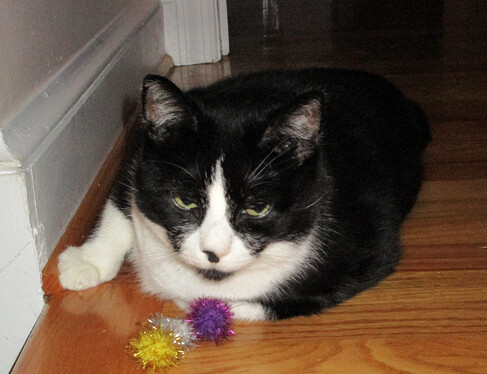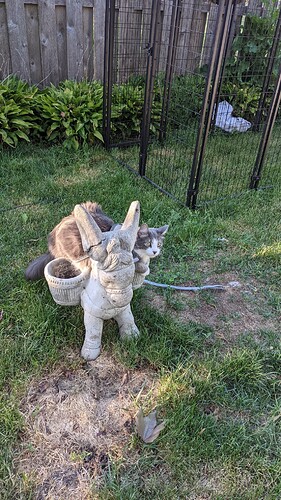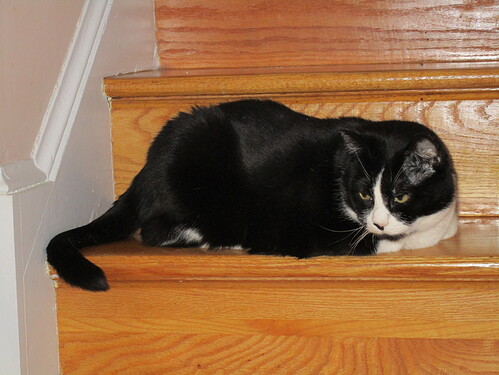Supervised Backyard Jaunt
I OOOH’ED as soon as I saw this!
So no trouble with the harness?
Clark’s desire to go outside has made him come running when I pick up the harness.
Lewis…not so much.
She slept with me most of last night, either next to my hip/butt or by my head. This is from earlier today, noon maybe.
It’s been a while since I’ve posted a Yami update.
Yami is six months old, and looks like this now:
Here’s the full progression, (mostly) week by week:
Here she is compared to a few of her sisters:
(Top Left: Kiwi/Vivian, Top Right: Lily, Bottom Left: Yami, Bottom Right: Harley Quinn)
Her brother (same parents, different litter) appeared at the Westminster dog show recently, and took home a major award.
We think they look a lot alike, especially the tree trunks for hind legs.
Since she’s mostly done growing, my wife made her a couple of custom sun PJs so she can be outside without risking a sunburn.
Somewhere else I think I mentioned our cat Lyta has either IBD or GI lymphoma. Ordinarily our vet would get a full wall biopsy of the intestine, which requires surgery, to determine treatment. Alas Lyta also has a minor heart problem, so surgery’s out. Thus the vet is playing it safe, and we are starting some chemo, chlorambucil and predisone. Tonight she’s getting the first of the former, which requires using a pill popper to pop it down her throat.
For some reason, she likes to occasionally shake her head. It’s kind of adorable. This morning my wife mentioned we’re starting the chemo tonight, and I said “Lyta, are you going to be a good girl tonight?” And she shook her head.
I adore her nose.
Yeah, the little schmutz makes her esp. cute. Also the black chin.
Lyta’s had an interesting couple of months. The upshot is that she seems to feeling good. And good quality of life is everything. But she’s still on chemo for GI lymphoma. Well, one of them.
Summary
Here are all the meds she’s been on the last few weeks:
- Chlorambucil (chemo for suspected GI lymphoma)
- Prednisolone (ditto)
- Flagyl (for diarrhea)
- B12 (ditto)
- Atenolol (for heart murmur)
- L-lysine (for a couple days’ worth of upper respiratory infection, probably a herpes virus common in cats)
Honestly it was hard to see what was helping and what wasn’t. The Flagyl was for only two weeks at the beginning of chemo to get the GI symptoms under control. Instead, we realized it made her much sicker, so we stopped it. She definitely got better after that.
The B12 supplements are also supposed to help with GI symptoms. Likely she has a deficiency due to the lack of good absorption in the GI tract. She’s still on that. It seems to help, without any obvious side effects.
We are continuing the atenolol. The cardiac vet recommended we double it after a week, but what with all the other medication confusion we left it at the lower dose. At last week’s checkup, it seemed to have made the murmur go away (though our vet said, and I quote, “It might be due to the flab.” Now that may seem unkind, but our vet is so hilarious all the time we took it in stride. And Lyta didn’t seem to mind.) The consensus was to leave it at the lower dose.
The L-lysine was supposed to go on indefinitely but we stopped that when she got better. It was a tuna-flavored goo in a can like Cheez-Whiz, and it also gave her tummy problems (as all fish seems to do). Doesn’t come in chicken or beef.
And we’ve had to suspend the chlorambucil for the nonce due to anemia.
Poor little cat! But hopefully we’ll get everything sorted out, and give her some time enjoying life, playing with balls, getting petted, eating food, sleeping a lot, and just generally hanging around like a duchess like most cats do.
Luke was Rx’d amoxicillin for his upper-respiratory infection that he had when we first got him; I wonder if they still prescribe it for that? Plus, he was a kitten at the time.
She is so squeedorable! Especially her parti-booper!
Aw, get well soon, little girl.
A few year back I had to give one of my cats a twice-daily antibiotic pill, to treat a bone infection. From the way he howled and fought to get away you would have thought I was torturing him. He started finding creative ways to hide from me when I woke up in the morning, and when I got home from work in the evening. After he finally swallowed the pill and I let him go, he went right back to being his friendly old self as if nothing had happened.
It’s hard being a caretaker to pets sometimes. They don’t know why we subject them to veterinary visits and medications. Their instinct when they feel bad is to just lay low until they feel better.
Sometimes when I drive past a veterinary clinic or animal hospital, I quietly send my best wishes to the patients inside.
Thanks guys!
Were they able to show it was bacterial? When our vet started Lyta on lysine, she mentioned herpes, which confused me – but apparently that’s the cause of a lot of URIs in cats. So it never goes away, but I guess the lysine can get it under control.
Sweet of you! 
But a bone infection – eesh, that sounds painful.
So far we’ve been lucky with administering meds. Dyson gave us a little trouble: I could hold him upside down while my wife dropped the pill in, but for the first few months I wore leather grill gloves my sister once gave us to protect my hands. The little nuisance. Well, we do miss him.
But you’re right; they have no idea why we’re doing these things. All we can do is hope they enjoy a better life.
I don’t remember. I’m guessing it was, cos it cleared it up completely.
I respectfully disagree, though it may vary from animal to animal. It may go like this for them:
A: Not feel normal! Do not want!
(human notices A behaving abnormally, takes steps necessary to alleviate and eliminate, which may cause A discomfort)
A: Do not want!
(human succeeds in administering to/treating A)
A: Feeling more normal!
(A makes connection perhaps that human’s weird actions had something to do with the feeling more normal.)
I’m just guessing, though.
You may be right! Our cats have resisted drugs at first but then accepted them as normal. Interesting.
I guess I was thinking of the time gap between going to the vet and actually making a difference in their health.
